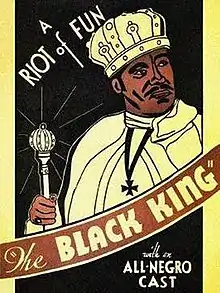The Black King (film)
The Black King is a comedy-drama[1] 1932 race film chronicling the rise and fall of a fictionalized charismatic leader of a back-to-Africa movement, modeled on the life of Marcus Garvey. The film was directed by Bud Pollard.
| The Black King | |
|---|---|
 | |
| Directed by | Bud Pollard |
| Written by | Morris M. Levinson & Donald Heywood[1] |
| Starring |
|
| Edited by | Dal Clawson |
| Distributed by | Southland Pictures |
Release date |
|
Running time | 72 minutes[1][3] |
| Country | United States |
| Language | English |
Themes
The Black King chronicles the rise and fall of a fictionalized charismatic leader of a back-to-Africa movement, satirizing the life of Marcus Garvey.[4][5] The film explores numerous critiques of Garvey's movement, including the lack of knowledge about Africa, the presumptuousness in making plans for future development and government in Africa without consultation of people already there, and conflicts between lighter skinned and darker skinned African Americans.[5] While Garvey was a primarily a political leader with religious opinions, his counterpart in the film was primarily a preacher and religious leader.[6][5] The film was intended to resonate with the audience's pre-existing disillusionment with Garvey.[4]
History
The Black King was written as a stage play by Donald Heywood and plans were publicly announced to produce it on Broadway directed by Russian choreographer Léonide Massine. This never took place. Instead, Heywood's story was adapted by Morris M. Levinson and it was produced as a film by Southland Pictures under white director Bud Pollard in 1932.[7] The film was re-released in the 1940s under the title, Harlem Big Shot.[5]
Reception
Daniel J. Leab, a 1975 commentator, rates it well as entertainment, saying it has "a more carefully plotted storyline than most other black genre films of its time".[5] Kevin Thomas of the Los Angeles Times wrote in 1988 that despite the film's small budget, the film has "considerable scope and energy ... largely due to a dynamic, brutally comic burlesque of ... [lead actor] A. B. Comathiere".[4]
Citations
- https://www.imdb.com/title/tt0022692/
- https://www.allmovie.com/movie/the-black-king-v5889/cast-crew
- "Collection: Films by Title: "B"". The Black Film Center/Archive. Indiana University Bloomington. Retrieved May 6, 2020.
- Thomas 1988.
- Leab 1975.
- Weisenfeld 2007, p. 138f.
- Weisenfeld 2007, p. 138.
References
- Leab, Daniel J. (1975). "A pale black imitation: All-colored films: 1930–1960". Journal of Popular Film. Informa UK. 4 (1): 56–76. doi:10.1080/00472719.1975.10661756. ISSN 0047-2719. ProQuest 740764983.CS1 maint: ref=harv (link)
- Thomas, Kevin (February 11, 1988). "'Black King' Caps 'Talkies' Series". Los Angeles Times.
- Weisenfeld, Judith (2007). Hollywood be Thy Name: African American Religion in American Film, 1929–1949. University of California Press. ISBN 978-0-520-22774-3.CS1 maint: ref=harv (link)
Further reading
- Gue, Randy (1996). "'It Seems That Everything Looks Good Nowadays, as Long as It Is in the Flesh & Brownskin': The Assertion of Cultural Difference at Atlanta's 81 Theatre, 1934–1937". Film History. 8 (2): 209–218. JSTOR 3815335.
- Larson, Charles R. (1992). "The Black King Forgotten "Black?" Classic". Journal of Popular Film and Television. Informa UK Limited. 20 (2): 17–25. doi:10.1080/01956051.1992.9943965. ISSN 0195-6051.CS1 maint: ref=harv (link)